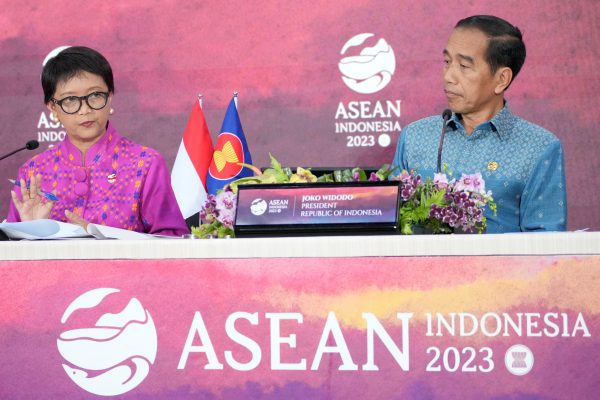Myanmar’s crisis is a threat to ASEAN centrality and its relevance as a key player in shaping the regional architecture. Since the February 2021 coup, ASEAN has been widely criticised for its inability to deal effectively with the crisis. Myanmar’s lack of progress on the Five-Point Consensus developed by ASEAN after a post-coup crisis meeting in April 2021 has strained ASEAN’s unity and dampened prospects for regaining regional peace.
But optimism towards improving Myanmar’s situation has resurfaced as Indonesia assumes ASEAN’s rotating chair. Meaningful progress was unveiled at the 42nd ASEAN Summit in May 2023. The timely completion of the Joint Needs Assessment by the ASEAN Coordinating Centre for Humanitarian Assistance on Disaster Management and the partial delivery of humanitarian aid to Myanmar on 7 May 2023 can be largely credited to Indonesia’s back-channel efforts.
These developments are hardly surprising as Indonesia has used backdoor shuttle diplomacy to encourage stakeholders to mediate and facilitate an inclusive national dialogue in Myanmar. The question is whether this approach can dissolve hostility in Myanmar.
ASEAN, like any other regional organisation, is not immune to intra-regional disputes. The 2008–11 Preah Vihear Temple conflict caused fatalities and a prolonged standoff between the opposing Thai and Cambodian camps. When Indonesia assumed the ASEAN chair in 2011, it handled the conflict head on and played a meaningful mediating role. Indonesian shuttle diplomacy helped reinstall severed communication channels and establish joint border committees to resolve the conflict.
As Indonesia decides to mediate Naypyidaw’s conflicting parties, Jakarta’s efforts may help promote peace in Myanmar as it did in the Preah Vihear Temple dispute.
Indonesia’s shuttle diplomacy in Myanmar is in its early stages. According to Indonesian President Joko Widodo, the core objective is to facilitate an inclusive national dialogue in Myanmar. This is an uphill battle.
The various factions manoeuvring for power in post-coup Myanmar have different goals than Phnom Penh and Bangkok during the Preah Vihear Temple conflict where — despite a border skirmish — desires to resolve the dispute through peaceful means were present on both sides.
But antagonism between the ruling State Administration Council (SAC), National Unity Government and ethnic armed organisations in Myanmar is deep and wide. The SAC severely undermined trust between the groups when it violated the 2015 nationwide ceasefire agreement. The National Unity Government and ethnic armed organisations regard the SAC as terrorists without any desire for reconciliation. This zero-sum power struggle, complicated by a situation where no faction has achieved dominance in Myanmar, has made a national dialogue unattractive to all parties involved.
Since facilitating national dialogue between internal stakeholders to achieve peace is a priority within Indonesia’s shuttle diplomacy, Jakarta’s success hinges upon its ability to convince all parties that dialogue is in their interests. So far, Indonesia has engaged with these parties bilaterally but has yet to convene all parties to the negotiating table.
The neutrality of Indonesia’s position in engagements among internal stakeholders is open to question. During the onset of the Preah Vihear Temple dispute, Indonesia neither issued any statements nor took any concrete actions that suggested its partiality towards Cambodia or Thailand. This neutrality meant both parties were eventually willing to accept Indonesia’s bridging role.
But this is not the case in the Myanmar crisis. After the February 2021 coup, Indonesia issued a strong condemnation of the SAC. Indonesia also voted in favour of a United Nations resolution to condemn the SAC and called for the unconditional release of National League for Democracy political detainees. As Jakarta plays a mediating role, the SAC may be highly sceptical of Indonesia’s proposed national dialogue and see it as a ruse to weaken its rule. Indonesia’s shuttle diplomacy may still play a constructive role by bridging differences and reducing miscommunications between competing factions.
Another related challenge stems from external engagements, as Indonesia intends to engage with the United States and China. Indonesia must rally external parties to collectively pressure internal stakeholders — especially the SAC — into a national dialogue. It must also ensure external parties do not indirectly profit from the crisis.
These objectives might be achievable for some external stakeholders such as the United States, which is keen to cooperate with ASEAN on the Myanmar crisis. But this is certainly not the case for China and Russia, who support the SAC through trade and arms supplies.
China and Russia might be open to assisting Indonesia in facilitating a national dialogue given their interest in safeguarding their economic interests, but both are unlikely to view the crisis dispassionately. To China, Myanmar is a geostrategic alternative for China’s energy imports and a key player in the Belt and Road Initiative, while Russia needs staunch supporters during its war with Ukraine.
Indonesia’s shuttle diplomacy faces the mammoth task of engaging all major powers, especially the United States, China and Russia, to exert maximal pressure on Myanmar’s stakeholders to settle differences through peaceful means.
The clock is ticking fast as Indonesia faces these tough challenges. Even if the Myanmar crisis lasts well beyond Indonesia’s ASEAN chairmanship, Jakarta’s shuttle diplomacy should be lauded as an admirable effort to preserve ASEAN’s credibility and reputation.
Anthony Toh Han Yang is Research Analyst at the S Rajaratnam School of International Studies, Nanyang Technical University, Singapore.

